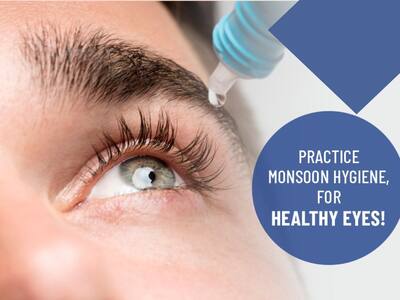
The expert claims that during the monsoon, our eyes are especially susceptible to infections and other problems.
The rainy season, also known as the monsoon season, brings relief from the scorching summer heat and rejuvenates the environment. While the rains bring joy and excitement, they also bring a set of challenges, particularly when it comes to eye health. The increased humidity, water-borne infections, and overall dampness can adversely affect your eyes. However, with proper care and precautions, you can keep your eyes healthy and bright during the rainy season.
Keep Your Eyes Healthy And Bright During The Rainy Season For Monsoon Protection
Here are some essential tips for monsoon eye protection:
Wash Your Hands Regularly
The monsoon season is notorious for water-borne infections, and many eye-related issues can be prevented by maintaining good hand hygiene. Make it a habit to wash your hands thoroughly with soap and water before touching your eyes or applying eye drops or medications.
Avoid Touching Your Eyes
During the monsoon season, your eyes are more vulnerable to infections. Avoid touching or rubbing your eyes with dirty hands, as this can introduce harmful bacteria or viruses, leading to eye infections.
Use Clean Water
Whether it’s for washing your face or cleaning your eyes, always use clean, filtered water. Contaminated water can contain harmful microorganisms that can cause conjunctivitis, corneal infections, or other eye diseases. If you accidentally get dirty water in your eyes, rinse them with clean water immediately.
Use Protective Eyewear
If you are venturing outside during heavy rains, protect your eyes with waterproof or wrap-around sunglasses. They not only shield your eyes from raindrops but also protect them from dust, debris, and harmful UV rays. Wearing sunglasses with UV protection helps prevent long-term damage to your eyes caused by the sun.
Maintain Good Hygiene For Contact Lenses
If you wear contact lenses, it is crucial to maintain strict hygiene during the rainy season. Follow proper cleaning and disinfection techniques recommended by your eye care professional. Avoid wearing lenses while swimming or in excessively humid conditions, as it increases the risk of eye infections.
Avoid Sharing Personal Items
Sharing personal items like towels, handkerchiefs, or eye makeup during the monsoon season can increase the chances of eye infections. These items can carry bacteria or viruses, which can easily transfer from one person to another. Always use your items and avoid sharing them with others.
Keep Your Surroundings Clean
Dampness and stagnant water during the monsoon season create a breeding ground for mosquitoes and other insects. Mosquito bites can lead to eye-related diseases such as dengue fever, chikungunya, or malaria, which can have severe ocular complications. Ensure no stagnant water is around your living or working area and use mosquito repellents to minimize the risk.
READ RELATED: I Tried Every Steak at Outback Steakhouse & There Was One Clear Winner
Eat a Nutritious Diet
A well-balanced diet rich in vitamins and minerals is essential for maintaining good eye health. Include foods like carrots, spinach, citrus fruits, almonds, and fish in your diet, as they contain essential nutrients that promote healthy eyes. Stay hydrated by drinking an adequate amount of water to keep your eyes moisturized.
Take Breaks From Digital Screens
With the monsoon showers, you might find yourself spending more time indoors. However, increased screen time can strain your eyes and lead to conditions like dry eyes, eye fatigue, and blurred vision. Remember to take regular breaks, blink frequently, and follow the 20-20-20 rule: every 20 minutes, look at an object 20 feet away for 20 seconds.
Visit An Eye Care Professional
Regular eye check-ups are essential, especially during the monsoon season. An eye care professional can detect any underlying eye problems and provide appropriate treatment. If you experience any discomfort, redness, itching, or vision changes, consult an eye specialist immediately.
By following these simple yet effective tips, you can keep your eyes healthy and bright during the rainy season. Remember, prevention is better than cure, so prioritize your eye health and take the necessary precautions to enjoy the monsoon season without any eye-related troubles.
Disclaimer: This article is meant for informational purposes only and must not be considered a substitute for advice provided by qualified medical professionals.
Total Wellness is now just a click away.
Follow us on
Don’t Miss Out on the Latest Updates.
Subscribe to Our Newsletter Today!
window.addEventListener(‘load’, (event) => {
$(‘#commentbtn’).on(“click”,function(){
(function(d, s, id) { var js, fjs = d.getElementsByTagName(s)[0]; if (d.getElementById(id)) return; js = d.createElement(s); js.id = id; js.src = “//connect.facebook.net/en_US/sdk.js#xfbml=1&version=v2.3”; fjs.parentNode.insertBefore(js, fjs);}(document, ‘script’, ‘facebook-jssdk’));
$(“.cmntbox”).toggle();
});
});








